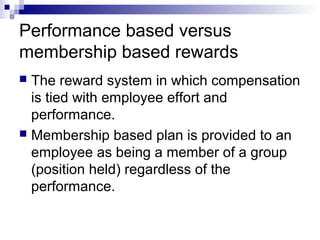Do not directly motivate job performance. Membership and seniority-based pay.

Why Is Employee Reward And Recognition Important
1 Build a Healthcare Spending Account HCSA into your plan that provides employees with an HCSA of 200 for every year of service with a cap of 2000.
.png?width=1920&name=Seniority%20Vs%20Performance%20%20(1).png)
. It ex-plores two key explanations of this tendency. Membership-based rewards may attract job applicants and seniority-based rewards reduce turnover but these reward objectives tend to discourage turnover among those with the lowest performance. This was discussed in the previous chapter.
Job evaluations systematically evaluate the worth of each job within the organization by measuring its required skill effort responsibility and working conditions. They are difficult to use in organizational settings. Do not directly motivate job performance.
The problem with membership and seniority-based rewards is that they. However they do not directly motivate job performance. There are a number of ways to classify rewards.
Student Value Correct Feedback Response Answer A. On the contrary they discourage poor performers from seeking work better suited to their abilities. These categories are far from being mutually exclusive.
The problem with membership and seniority-based rewards is that. The problem with membership and seniority-based rewards is that they. Prevalence of seniority-based reward distribu-tion in everyday life.
First to determine whether seniority-based reward distribution emerges as a consequence. 60The problem with membership and seniority-based rewards is that they. Performance Based and Membership Based Rewards.
It reinforces status differences. 2 Base an HCSA on a percentage of earnings. When applied to non-management employees which of the following has a weak connection between the reward and individual effort.
Employees earn 10 per hour when they are hired and they can earn up to 20 per hour if they master all 12 work units in the production process. Cdo not directly motivate job performance. Seniority rule at work plays a vital role in the success of the company.
Do not directly motivate job performance. They do not directly motivate job performance. Companies can learn from this example although seniority-based rewards tend to attract job applicants with security needs reduce stress and sometimes improve loyalty.
The largest portion of most pay checks is based on the persons membership and seniority. The following points help you understand how does the seniority system work. On the contrary they discourage poor performers from seeking out work better suited to their abilities.
The problem with membership and seniority-based rewards is that. Are difficult to use in organizational settings. Do not directly motivate job performanceD.
Hence reward systems serve a very basic motivational function. Three of the more typical dichotomies are. They do not directly motivate job performance.
Which of the following is a disadvantage of financial rewards based on membership or seniority. However they do not directly motivate job performance. Rewards based on job status try to maintain internal equity and motivate employees to compete for promotions.
A good rewarding system should have following characteristics. Are difficult to use in organizational settings. It has been found that reward systems in no.
Performance based rewards may be piece rate pay plans commissions etc while membership based rewards may be profit sharing increase in dearness allowances seniority based or time bound promotions etc. They are difficult to use in organizational settings. The problem with membership and seniority-based rewards is that.
Reward systems have also been shown to influence an employees decision to come to work or to remain with the organization. It doesnt directly motivate performance. They discourage people from remaining with the organization.
It relies on subjective measurement of competencies. One problem with seniority-based rewards is that they cause higher turnover. The problem with membership and seniority-based rewards is that they.
Discourage people from remaining with the organization. They are difficult to use in organizational settings. Discourage people from remaining with the organization.
Pays employees a higher hourly rate as they learn to operate more parts of the work process. The present research investigates the man-ner in which members seniority influences reward allocation in formal groups. Adiscourage people from remaining with the organization.
Bare difficult to use in organizational settings. They will provide opportunities to become representatives or leaders for a particular group of employees. Here are three examples of how this can be done.
They discourage people from remaining with the organization. They will treat as a valuable employee. These membership- and seniority-based rewards potentially attract job applicants particularly those who desire predictable income and reduce turnover.
A custom benefits plan can be designed that will compensate within a job class based on seniority. Intrinsic versus extrinsic rewards financial versus non financial rewards and performance-based versus membership based rewards. They discourage people from remaining with the organization.
Employee commitment to the organization.

Solved 19 Scientific Management Is Most Closely Associated Chegg Com
Sets The Employee Rewards Up And Make Your People Happy
.png?width=1920&name=Seniority%20Vs%20Performance%20%20(1).png)
Seniority Vs Performance What S More Important To Get Promoted

0 Comments